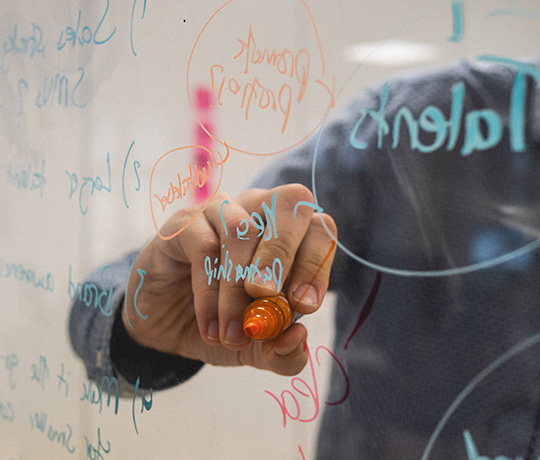Learn how to collaborate with your university peers, take project leadership and get the best grade with these group assignment tips for students.

Group projects. Group work. Maybe you call them group assignments. They’re often dreaded words. Even though we’ve been doing them since our kindergarten teacher told us to pair up and colour together as a team, we still get that sinking feeling when we hear it’ll be 30% of the coursework. How will we assign roles? What online group project tool shall we use?
Whether you’re studying science, business, law, arts or German, group projects are unavoidable. The bad news is, even after you’ve left uni, the rest of your career will be littered with group projects, so you might as well get used to them and upskill your teamwork with these tips and tricks.
The good news is, there are plenty of strategies and collaboration tools to help you cope and even thrive in group assignments. In fact, companies like Google and Atlassian have been studying how to build the perfect team (check out Project Aristotle for a great read). Ok, so they haven’t exactly cracked it either, but there are some pretty useful insights.
Though it’s been a while since my group project days at university, I’ve spent the last few years building digital teams in agencies and the last decade running projects. Tools like Atlassian’s Team Playbook have been a great resource. So here are some tips that have helped me create some great work in group projects throughout my career and conquer the challenges of group assignments that I hope you’ll find useful.
Dream Teams Are Built, Not Found
We’re all human. We all have our strengths and weaknesses, and more often than not in a group project, we’re thrown together, rather than built by design. This will be the same in your working life: the crack strategist is busy on another project, your favourite creative duo that you click best with is off on annual leave.
But that doesn’t mean the team you are with is without value. Abandon any preconceived notions that you’re going to be able to just cruise along with the best-in-class from the get-go, and get on to the real work.

Don’t Wait. Assume You’ll Need To Step Up and Take Responsibility
This is the big one. Don’t assume someone else is going to rise up and take charge. If you’re not usually a natural-born, bolshy type A kinda person, don’t worry – this doesn’t mean you have to become one. Everyone approaches work in a different style and it takes all kind to make a good team. What I mean is take responsibility for yourself and your own grade – and don’t be a victim and wait for it all to fall apart or be too late to start good work before you plan a meeting. Someone needs to be a leader in the group assignment, so why not take up the role?
Be Clear On The Project’s Ultimate Goal and Purpose
Now that your individual mindset is covered, it’s time to set the mission. Before you get to anything else, read through the assignment and requirements as a team and discuss what you think the output of the project needs to be. What will “success” look like at the end of the group project?
Take your time to read through the requirements and discuss them as a team to make sure everyone (and we mean everyone) is on the same page from the outset. It gives you a common story to work with and also it’s an immediate common ground. So it’s a simple way to start bonding with your teammates, which is important too.
Establish Your Group’s Roles & Responsibilities
In Google’s Project Aristotle, clearly defining each team member’s roles and responsibilities is key to success. Teams fall apart with individuals think a particular task is someone else’s responsibility or is afraid to make a decision on a component of the work.
After you’ve agreed on the output of the project and what you are all working together to achieve, break it up to the steps that you need to get there. I find it easiest to work backwards.
Is it a presentation? If so, what is the outline of the presentation? Will it need to be designed? Do you all need to present or is it just submitted on the due date? Break it up to small, achievable steps and put it in order of when it needs to be done. These are called milestones. It’s important to have a few of these along the way so you know you’re on track.
Then, spend some time to get to know each other’s passions and weaknesses. Is one person most comfortable with Photoshop? Is another better with writing words? Another with the research and analyses?
Put a name against each step of the project – they will be that task’s project owner. They can bring people to support them in this task, but ultimately, they’re responsible for getting that part done and to a standard the whole team is happy with.

Getting RACI
A great framework for assigning tasks and holding each other accountable is called a RACI. This stands for Responsible – Accountable – Consulted – Informed. Atlassian has a great explanation and illustrated examples of this, but in a nutshell:
- Responsible – The person(s) appointed to get the work done for this task
- Accountable – The person who is in charge of making sure this task is complete and to a good standard. There can only be one person accountable. They may not be doing the work, but they are ultimately “the throat to choke”
- Consulted – The person(s) who need to be notified and asked for their opinion on the task. There may be several people here, there may be none, depending on the project
- Informed – The person(s) notified of what’s happening or that the task is complete. This person doesn’t need to “sign off” – it’s just an FYI.
Stand Up for Good Work
Toyota was famously turned around by the Kaizen principle and the story is worshipped as almost law in most Silicon Valley or tech startups. And for good reason (read an excellent article about it in Quartz here). Central to Kaizen is the idea that every member of the team is responsible for the final output, so every member is empowered to stop the process and make a change if they see something.
In a group project, if you see someone not producing up to the team’s standard – slacking off, or being tardy all count – be empowered to speak up. With your clearly-defined roles and responsibilities, you can refer back to your originally-agreed RACI chart and hold them accountable. It’s not rude, it’s not a power-trip (although, don’t abuse it either) – you have the group’s interest at heart, so it’s your duty to hold each other accountable and get the best grade you can.
Celebrate The Wins & Be Positive
From my experience, this is the difference between a good team project and a great one. Everyone knows that group projects can be hard. Hell, uni itself is stressful enough! So celebrate the small wins. Found a great piece of research that will make for a great supporting point? Results of the experiment go better than planned? Or did you simply hit a milestone on time? Celebrate that. Mark the occasion with a pizza party or even just a digital high-five via Slack. Celebrating milestones together doesn’t just give you that little dopamine boost you need to relieve the stress, it will help create a shared moment and make your team stronger and more aligned. Ultimately creating better work and that all important result.
Most of all, remember to stay positive. I’ve met many great friends through uni and work projects – many of whom I still keep in touch with. You’ll need to work together and get through the course no matter what, so it’s a lot easier to do it with a positive attitude and try to have a good time together (and share the load!) than making each meeting or milestone a surly occasion. You’ll leave never needing to ask why group assignments are so bad again.
And hey, worse comes to worst, remember that group projects are finite, not forever. It’ll all be over before you know it, so hang in there!





















